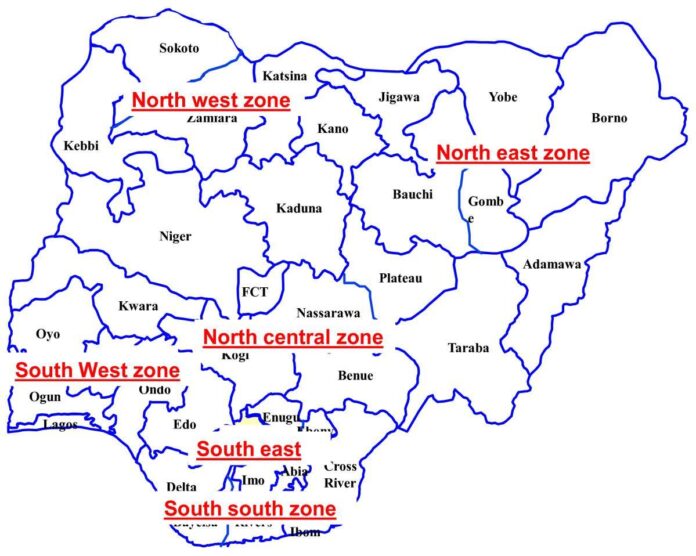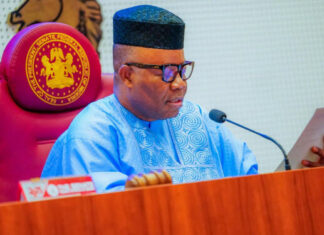GDP decline to 2.98% drags Tinubu’s $1tr economy, “is an aspirational target”
By Jeph Ajobaju, Chief Copy Editor
Bola Tinubu’s vision of a $1 trillion economy, which he unveiled upon becoming President on 29 May 2023, is being dragged by historical headwinds, among them unstable power supply, unreliable policies, insecurity, weak naira, treasury looting, and industrial-scale corruption.
These and other negative factors depressed Gross Domestic Product (GDP) to 2.98 per cent in the first quarter of 2024 (Q1 2024), and there is no concrete thing on the ground to show the situation has changed for the better.
Tinubu enthused in October 2023 at the 29th Nigeria Economic Summit in Abuja that the economy can grow to $1 trillion by 2026, stressing that a $3 trillion economy is possible in a decade with the government ensuring “double-digit, inclusive, sustainable and competitive growth.”
However, Adegbemi Onakoya, a professor of development economics at Babcock University, has warned this trillion-dollar economy “is not achievable, but it is an aspirational target. That is the stretch strategy.”
Impact of naira devaluation
Naira devaluation has triggered a loss of about $330.98 billion in GDP when converted from naira to dollar, reports Nairametrics.
Nigeria amassed a total N237.53 trillion GDP from Q2 2023 to Q1 2024 in nominal terms, and converted at Central Bank of Nigeria (CBN) rate of N1,303.84/$1 in March 2024, GDP stands at $182.18 billion – which would have been $513.16 billion at the forex pre-unification rate of $462.88/$1.
For Nigeria to grow to a $1 trillion economy by 2026 at a GDP of N237.53 trillion, naira has to appreciate to N237.53/$1, which is highly unlikely under the current macroeconomic conditions.
The International Monetary Fund (IMF) estimates Nigeria’s GDP to be $253 billion in 2024, slipping to the fourth largest economy in Africa due to naira devaluation.
The NBS has begun the process of rebasing GDP and Consumer Prices Index (CPI) estimates, as recommended by the United Nations Statistical Commission to be carried out every five years.
Some analysts argued rebasing the economy is a good thing, but others disagree.
Ode Ojowu (former National Planning Chief Executive)
Ojowu expressed support for the plan, saying since the last rebasing in 2014, Nigeria has experienced significant structural changes in various sectors.
Muda Yusuf Centre for the Promotion of Private Enterprise (CPPE) Chief Executive Officer
Yusuf said rebasing the economy will provide “a clearer picture” of the true value of Nigeria’s GDP.
__________________________________________________________________
Related articles:
Tinubu’s Nigeria is not working
Tinubu’s renewed hope agenda a scam for hopelessness, Northern elder fumes
Suswam reiterates Tinubu lacks capacity to change Nigeria into a productive country
Akintoye insists Yoruba Nation wants ‘separate country’, not restructuring Nigeria, a failed state
__________________________________________________________________
Tajudeen Ibrahim (Chapel Hill Director of Research and Strategy)
“Rebasing the GDP is good, but it is not necessarily, what can take us there very quickly. What we are just doing is recapturing the existing activities. We are not creating new economic activities, which is what I believe is important in this case.
“I think the chances of achieving a $1 trillion economy is very slim based on the volatility in the exchange rate that we have seen so far and based on the fact that we are considering short-term solutions to our exchange rate challenges.
“It does not look to me like we are considering long-term sustainable solutions. That is why there is little or no conviction that over the next seven years of the current administration, it does not look like we will achieve a $1 trillion economy.
“But if we can fix our challenges by addressing the fundamental issues that have been the major challenges, then we can be talking about the relative stability of the currency over the medium to long term. By then, we can be thinking or talking about something that is even more than the $1 trillion economy in terms of size.”
Adegbemi Onakoya (professor of development economics, Babcock University)
“What the government can do is to locally increase output, especially in the oil and gas sector. Intensifying the harvesting of value in the solid mineral sector because that is where the money is.
“We are endowed with all mineral resources you can speak about in Nigeria. The government should ensure that the sector is organised, and the money being realised is not going into private pockets.
“The government can make nothing less than $200 billion from mining lithium, and should also strengthen the agricultural sector for the country to be able to feed itself.
“For any economic policy to be sustainable, it takes not less than three years, and it appears the current administration is in the right direction.”











